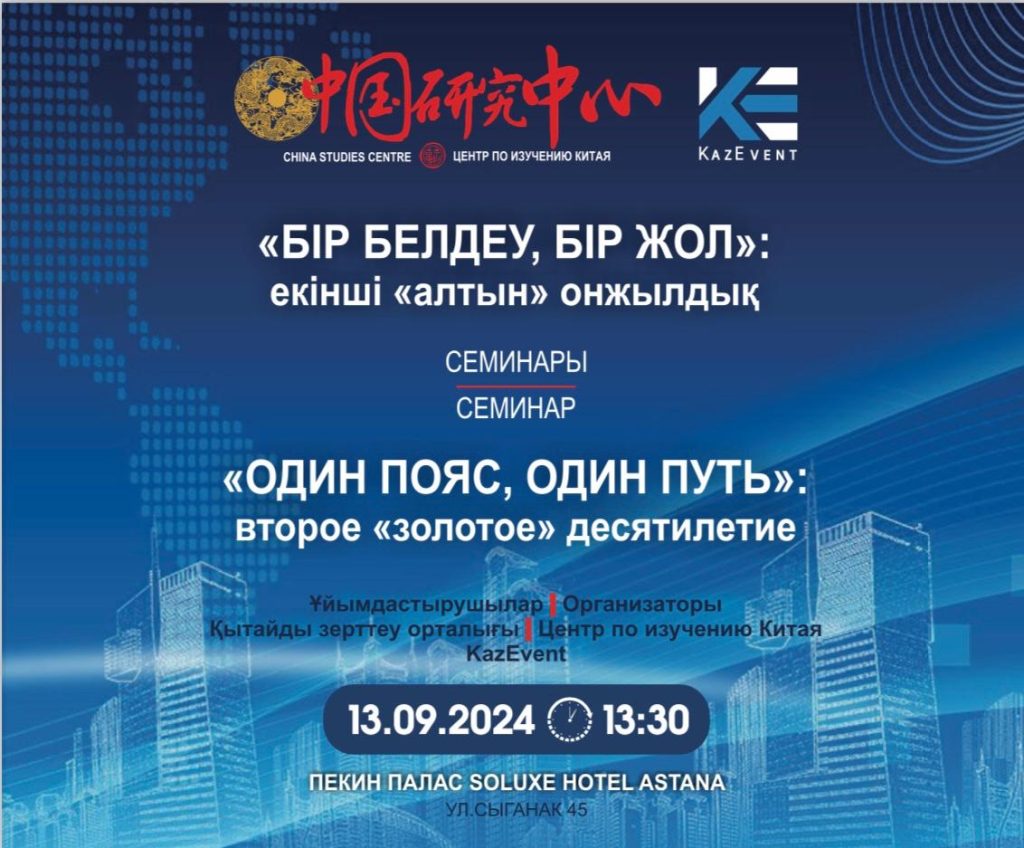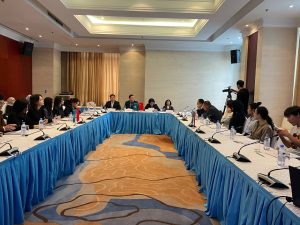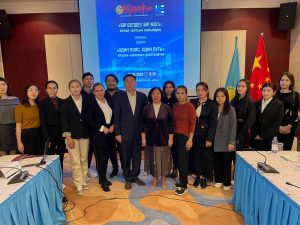
Astana, September 13, 2024 — A seminar titled «Belt and Road: The Second «Golden» Decade,» organized by the China Studies Centre, took place today in Astana. Held at the Beijing Palace Astana Hotel, the event brought together experts in international relations, economics, law, and representatives from leading technology companies to explore key issues and future prospects of Kazakhstan-China cooperation under the Belt and Road Initiative (BRI).
The seminar opened with a welcome speech from the Director of the China Studies Centre, Mrs. Gulnar Shaimergenova, who underscored the strategic importance of the partnership between Kazakhstan and China. She referenced President Kassym-Jomart Tokayev’s remarks, emphasizing the significance of the initiative for Kazakhstan. She recalled his speech at the second high-level Belt and Road Forum, where he stated, «From the outset, Kazakhstan has supported this initiative, recognizing it as a unique opportunity to develop the country’s transportation and logistics infrastructure. We must continue our active efforts to implement key projects that position Kazakhstan as a central transport hub within Eurasia». Shaimergenova noted that as the initiative, first proposed by Chinese President Xi Jinping in 2013, enters its second decade, it has gained new momentum in fostering deeper economic ties and cooperation across Asia, Europe, Africa, and beyond.
Shaimergenova also highlighted that 2024 marks the beginning of the second «golden» decade for the Belt and Road Initiative, stressing Kazakhstan’s critical role in this global project. She noted that the country now stands at the cusp of new opportunities to enhance international economic cooperation and strengthen its presence on the global stage. The BRI, she remarked, is driving development and prosperity for participating nations, strengthening global collaboration, and opening new horizons for shared progress.
In her welcoming speech, Ms. Xin Fangfang, Counsellor of the Chinese Embassy in Kazakhstan, emphasized the pivotal role Kazakhstan has played in the Belt and Road Initiative since its inception. «Kazakhstan is where the BRI was first announced and implemented. Under the strategic leadership of our two nations’ leaders, cooperation within the initiative has reached new heights. Connectivity has strengthened, trade cooperation has deepened, and monetary and financial collaboration has intensified», – she said. Xin underscored that the BRI has entered a new phase of high-quality development, with China ready to collaborate with all partners to promote progress, build a community with a shared future for humanity, and benefit people worldwide.

The seminar featured several key presentations exploring various aspects of BRI cooperation. Dr. Lazat Nursultanova, a professor at the International University of Astana, discussed the historical importance of the initiative for Central Asia and its role in reviving ancient Silk Road routes. She noted that, amid global challenges, the strategic partnership between Kazakhstan and China remains vital. The countries’ cooperation in areas such as energy, infrastructure, and trade is based on mutual respect and support. Nursultanova highlighted that the BRI has been crucial in strengthening economic ties and ensuring regional stability, with diplomatic dialogue between the two countries serving as a foundation for long-term collaboration.
Dr. Zhamaladen Ibragimov, a Doctor of Law, focused on the Shanghai Cooperation Organization (SCO) as an effective platform for fostering intergovernmental relations. He emphasized the principles of the «Shanghai spirit» — friendship, good neighborliness, equality, and mutual support — which have strengthened cooperation within the SCO. Ibragimov also highlighted the importance of transport links in fostering sustainable economic growth, and the need to elevate the Kazakhstan-China strategic partnership to new heights, benefiting both nations. He concluded by calling for the creation of a multipolar world based on fair development and global governance.
Professor Aiman Azmukhanova of the Eurasian National University discussed educational cooperation under the BRI framework. She underscored the critical role of academic collaboration in strengthening cultural and economic ties between Kazakhstan and China. She highlighted new opportunities for academic exchanges, joint research, and the training of highly qualified professionals, all of which contribute to mutual understanding and long-term cooperation between the two nations.
Xu Hai, Director of Huawei Technologies Kazakhstan, shared insights into digital technology cooperation between Kazakhstan and China, focusing on the transformative impact of AI and 5G on bilateral relations. “In addition to integrating cutting-edge technologies, we place significant emphasis on partnering with Kazakhstan’s universities. Huawei currently collaborates with 40 leading universities in Kazakhstan to build a reliable platform for knowledge exchange and the training of highly skilled professionals,” said Xu Hai, adding that youth engagement is a priority for the company, which supports promising students in their professional and innovative development.
Professor Yerlan Kudys of the Eurasian National University addressed the development of investment and trade turnover between Kazakhstan and China. He emphasized that foreign direct investment (FDI) remains a key driver of Kazakhstan’s economic growth. Kudys highlighted the growing potential for economic cooperation under the BRI, noting that Kazakhstan’s abundant natural resources, strategic geographic location, and consistently improving conditions for investors have attracted significant FDI, particularly from China. He pointed to the deepening cooperation in sectors such as infrastructure, agriculture, and energy as crucial to the economic development of both countries and the wider Central Asian region.
Botakoz Elshibek, Business Development Manager at the China-Eurasia Business Council, discussed the importance of youth exchanges in strengthening international relations. She emphasized that exchange programs and joint educational projects not only improve students’ skills but also foster international professional networks, which play a key role in the future development of diplomatic and economic relations. Elshibek highlighted that such exchanges are laying the groundwork for long-term cooperation and friendship between countries, particularly within the BRI framework.
The seminar demonstrated significant interest in the Belt and Road Initiative from both the academic community and business representatives. As the second «golden» decade unfolds, the initiative promises to open new horizons for strengthening economic, cultural, and political ties between Kazakhstan and China. The BRI has become an integral part of Kazakhstan’s long-term strategy for infrastructure development, digitization, and global economic integration.

A group of young scholars and graduate students from Astana’s leading universities also participated in the seminar, actively engaging in discussions and posing thought-provoking questions to the speakers. Their involvement sparked lively debates and was praised by experts, underscoring the importance of young professionals’ contributions to scientific discourse. The event concluded with key takeaways on the prospects for further strengthening Kazakhstan-China cooperation in the areas of economics, culture, and education. Participants underscored the strategic importance of the BRI in driving infrastructure development, digital transformation, and international trade. They concluded that the successful implementation of BRI projects will further integrate Kazakhstan into global economic processes, promote long-term sustainable growth, and enhance regional partnership ties.
